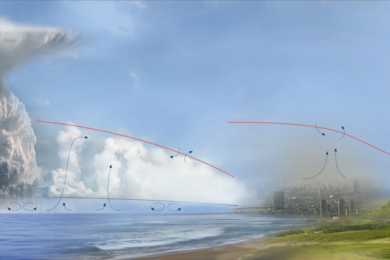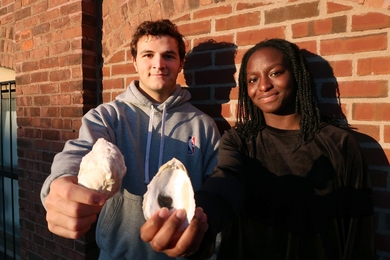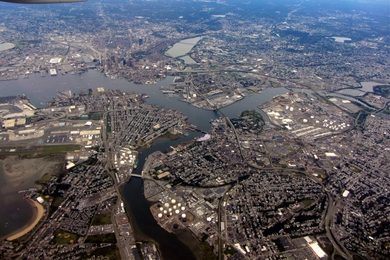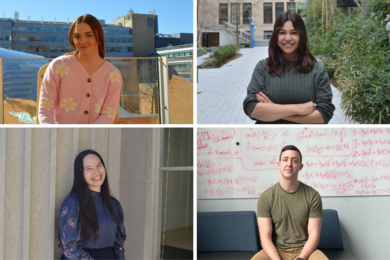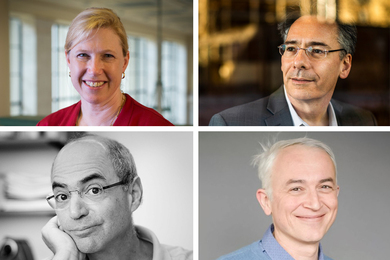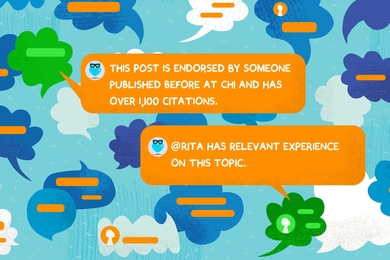As if taking a cue from the happiness generated by the graduating students and their families, the skies above Killian Court brightened during the last hour of commencement Friday (May 28) as MIT awarded degrees to 1,750 seniors and graduate students.
About 8,000 relatives and guests attended the exercises in Killian Court, undeterred by earlier showers and cool weather.
Because some students received more than one degree, the total number of degrees-1,959-exceeded the number of students receiving them. Altogether, 955 bachelor of science degrees and 1,004 advanced degrees were awarded. The advanced degrees included 215 doctorates, 766 master of science degrees and 23 engineer degrees.
The degree recipients included 540 women.
In the morning, prior to the exercises, the MIT Corporation, the Institute's board of trustees, elected four life members and 10 term members at its quarterly meeting. (See story below).
In the afternoon, about 30 graduating cadets and midshipmen in MIT's Army, Air Force and Navy Reserve Officers Training Corps (ROTC) units received their commissions on the deck of the frigate USS Constitution at the Charlestown Navy Yard Historical Park.
The formal commencement activities began with the traditional academic procession, led by the chief marshal, Robert A. Muh of San Francisco, Calif., a member of the MIT Corporation and 1992-93 president of the Alumni/ae Association.
Dr. Paul E. Gray, chairman of the MIT Corporation, presided at the exercises.
The invocation (See page 10) was given by Rabbi Daniel Shavitz, the Jewish chaplain at MIT who is leaving the Institute after 17 years to serve as rabbi at a synagogue in Oklahoma City.
The commencement speaker, President Carlos Salinas de Gortari of Mexico, strongly urged the ratification of the proposed North American Free Trade Agreement, terming it a "win/win/win situation" for the three countries that would be linked by the pact, Mexico, Canada and the United States. (See page 11.)
"If Mexico prospers, the US and Canada will prosper," the Harvard-trained economist said. "The Latin-American community is watching eagerly for NAFTA's success," he said, "because it means hope for the whole region, and for the rest of the world."
He added: "NAFTA is a job-creating agreement. Because by increasing competition in our three nations,...it will allow us to compete with regions which are getting together in Europe, and in the Asian Pacific countries...NAFTA is an environment-improvement agreement, because with additional resources, we will take better care of our environment. NAFTA is a wage-increasing agreement, because we are committed to increasing real wages in Mexico...when NAFTA is ratified. And NAFTA is a migration-reduction agreement, because Mexicans will not have to migrate north looking for jobs...but will be able to find them in my own [country]."
The relevance for the MIT graduates, he said, is that with economic globalization "you will compete for a job dependent on what happens in Europe, in the Asian Pacific countries, and also in Mexico
In his annual charge to the graduates, MIT President Charles M. Vest said that in a world fragmented by race, gender and geography, a balance must be struck between competition and cooperation. (See page 10.)
Dr. Vest said the message of cooperation is simple, calling upon individuals and nations to "respect and cherish" differences- "we thrive on differences of experience, culture and perspective"-but also to build common purposes and values.
However, implementation is difficult, he said, because "we seem to have fragmented along every conceivable fault line-fragmented by intellectual discipline, fragmented by race, fragmented by gender, fragmented by geography."
"With every such division, we lose more of our sense of common culture, common humanity, and common destiny."
The "world in transition" the graduates are entering, he said, "is a world in which new balances must be struck. We must resolve the tensions betwen competition and cooperation, between fragmentation and integration, and between nation and the world."
"We have learned the value of competition," he continued. "We know the value of the rugged individual and the iconoclast. But we are just beginning to learn the value of cooperation and teamwork."
"If we are to build the future we want for ourselves and our children, we must build it together," Dr. Vest said. "We must have a sense of common purpose. We must have an integrated, inclusive view of history. We must have community. We must have mutual respect. We must hold common values at the deepest levels."
Dr. Vest said the youth of the nation face an enormous challenge to regain leadership and economic competitiveness.
"But I fear that in our search to regain competitiveness, we run the risk of turning inward too much. We blame too many of our current problems on other nations. Isolationism and protectionism do not work in the long run. Despite our intense competition with Japan; despite the repugnant and morally outrageous nature of the disintegration of Yugoslavia; despite the growing gap between North and South, I am confident that the true historical trend is now one of communication, interaction, and cooperation."
Anand Mehta, president of the Graduate Student Council, delivered a salute to MIT from the graduate student body. Reshma P. Patel, president of the Class of 1993, presented the senior class gift to Dr. Vest-representing pledges over the next five years of $30,071-to augment MIT's recycling efforts. The "Recycle MIT" program funded by the class gift includes an educational component and the purchase of 50 recycling bins.
In an impromptu moment following Ms. Patel's presentation, Dr. Vest noted that it was her birthday and led the assemblage in a chorus of "Happy Birthday."
For the awarding of degrees, Dr. Vest presented diplomas to the bachelor of science degree recipients and also those receiving both bachelor of science and master of science degrees, while Provost Mark S. Wrighton gave out advanced degrees. The two lines of students approached the stage simultaneously, and the names were announced in an alternating pattern as the degrees were handed out.
Those receiving doctoral degrees already had been hooded in a special ceremony on the day before commencement in Rockwell Cage.
Following the commencement program, President Vest held a reception for graduates and their guests-and for alumni both of the 50th reunion Class of 1943 and the 25th reunion Class of 1968-at several locations in or near McDermott Court.
A version of this article appeared in the June 2, 1993 issue of MIT Tech Talk (Volume 37, Number 35).
